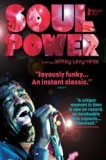| Reviews & Columns |
|
Reviews DVD TV on DVD Blu-ray 4K UHD International DVDs In Theaters Reviews by Studio Video Games Features Collector Series DVDs Easter Egg Database Interviews DVD Talk Radio Feature Articles Columns Anime Talk DVD Savant Horror DVDs The M.O.D. Squad Art House HD Talk Silent DVD
|
DVD Talk Forum |
|
|
| Resources |
|
DVD Price Search Customer Service #'s RCE Info Links |
|
Columns
|
|
|
Soul Power
I was grinning from ear to ear as Soul Power began, throwing us right in to a thrilling rendition of the title song by James Brown with the able support of his backing band, the JBs. The performance is from the Zaire '74 music festival, a three-day event intended to lead up to the "Rumble In The Jungle," the Don King-promoted title fight between George Foreman and Muhammad Ali. Foreman ended up injuring himself in training mere days before the bout, but due to scheduling issues, the music festival had to go on as planned.
The fight--and some of the music--gets the full doc treatment in Leon Gast's wonderful, Oscar-winning When We Were Kings; if you haven't seen that film, close this window right now and go rent it. If you have, then some of these details will already be familiar. What we didn't know was how much of the music (which is used intermittently, primarily for transitions and punctuation, in Kings) was itself filmed. Jeffrey Levy-Hinte's Soul Power is the story of that show.
It gives us exhaustive detail on how the festival was put together, using outside financing and local labor, with government cooperation that was tentative at best. The cameras catch the promoters in Zaire, constructing the stage and trying their best to get the elaborate show mounted with the help of their crew back in New York. Levy-Hinte spends too much time (over a third of the running time) on the run-up to the show, but we do see some terrific verité footage; there's a fascinating breakfast conversation between Ali and his trainer "Bundini" Brown (played by Jamie Foxx in Ali), as well as a fun pre-flight dinner party with the performers in New York. We also catch glimpses of the pre-show details: focusing lights, running sound checks, painting numbers on the concrete risers of the stadium location. These scenes are interesting, but there's too many of them; we're antsy for them to get on with it already.
Then, finally, the music starts, and it's all you can hope for: joyous, exuberant, and passionate. The gentle tones of Bill Withers' amazing voice is like a lullaby, while B.B. King does an electrifying rendition of "The Thrill Is Gone." African performer Big Black does a bongo number that absolutely brings the house down. The Spinners are tremendous, the Crusaders are phenomenal, and the James Brown footage is simply extraordinary. At their best, Brown and his band put on the tightest, most thrilling live show in the business, and their driving, dynamic performances of hits like "The Payback" and (especially) "Cold Sweat" are sensational. The photography and cutting of them is fairly standard and straightforward (especially considering when they were shot), but they do find some interesting shots, and what you're hearing is more important than what you're seeing anyway. Soul Power is fueled by the tremendous energy of the performances--these sequences are frenetic and alive.
The trouble is, there just aren't enough of them. Once the show starts, Levy-Hinte keeps cutting backstage, and while there are some good bits back there (the Spinners practicing their French greetings, B.B. King working out his set list), we'd rather see more of these folks on stage. The amount of actual performance footage in Soul Power is disappointing--we only get one song each from every performer but Brown, who does two in the film and one each during the opening and closing credits. That's a dearth of music for a performance movie. I'm not sure why the film went so much heavier on the documentary than on the music, but it's a lean mixture.
So that's my complaint, and who knows, maybe there will be a wonderful cache of deleted scenes waiting for me on the DVD. As it is, Soul Power will make an excellent second half of a double bill with When We Were Kings, and the performances that did make the cut are worth the trouble of seeking it out. At the end of its closing credits, an "in memory of" list scrolls by, and it's a long one; as we reflect on how many of these great talents we've lost, I'm thankful for this piece (tantalizingly brief though it may be) of what they left behind.
Jason lives in New York. He holds an MA in Cultural Reporting and Criticism from NYU.
|
| Popular Reviews |
| Sponsored Links |
|
|
| Sponsored Links |
|
|
| Release List | Reviews | Shop | Newsletter | Forum | DVD Giveaways | Blu-Ray | Advertise |
|
Copyright 2024 DVDTalk.com All Rights Reserved. Legal Info, Privacy Policy, Terms of Use,
Manage Preferences,
Your Privacy Choices | |||||||











